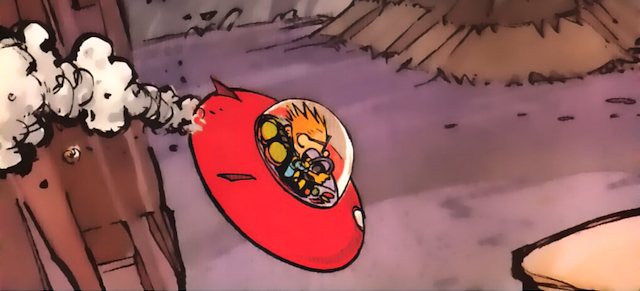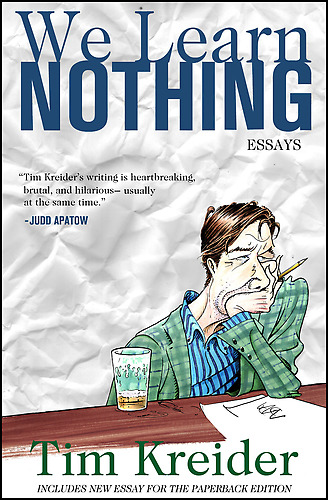
 How do you write about the reality of the human condition in concrete terms without coming off as sanctimonious or a total downer? I don’t know, but I think Tim Kreider may. I’m sure I’m not the only one who was so impressed with (and addressed by) his essay “The Busy Trap” that appeared in The NY Times recently that they immediately ordered his essay collection, We Learn Nothing, which came out in paperback last month. Hard to imagine there’s another volume out there with endorsements from both Judd Apatow and David Foster Wallace, not to mention an astonishing opening quote from King Lear, “The weight of this sad time we must obey; Speak what we feel, not what we ought to say.”
How do you write about the reality of the human condition in concrete terms without coming off as sanctimonious or a total downer? I don’t know, but I think Tim Kreider may. I’m sure I’m not the only one who was so impressed with (and addressed by) his essay “The Busy Trap” that appeared in The NY Times recently that they immediately ordered his essay collection, We Learn Nothing, which came out in paperback last month. Hard to imagine there’s another volume out there with endorsements from both Judd Apatow and David Foster Wallace, not to mention an astonishing opening quote from King Lear, “The weight of this sad time we must obey; Speak what we feel, not what we ought to say.”
After cracking it this week, DFW’s blurb, which I presume was written in reference to Kreider’s cartoon The Pain-When Will It End?, has been ringing in my head: “Kreider rules.” It’s true. This guy rules. It’s not just that he is funny in the extreme, or that he’s got a real gift for language, or that he’s clearly lived through a few things: it’s Kreider’s courage that I admire most. He uses the phrase “owning up” quite a bit, and I think it captures much of what makes these pieces so infectious and (counter-intuitively) encouraging. Think a slightly less raunchy/schlubby Louis CK, brutal but somehow not degrading, unafraid to excavate and expose his own self-justifications, to spill his guts and say the things we all think but never say.
For whatever reason (part of it is spelled out in the first essay), Kreider has been given to cut through the baloney–both about himself and the culture at large–in a way that should be a lot more disheartening than it is. One feels known by his diagnosis (preachers take note!), which includes a very clear understanding of the limits of understanding. And I don’t think it’s a stretch to say that as dark as some of his discoveries may be, because they are so undeniably truthful, they provide starting points for compassion–and even hope. Obviously we come to some different conclusions about the nature of that hope (i.e. his feelings on religion/faith are not exactly sympathetic), but the anthropological honesty is deeply refreshing and dare-I-say humanizing. Here’s a section from his essay, “The Creature Walks Among Us”, that I wish I’d had the chutzpah to write:
The usual rationale for our nosy interest in the private disgraces of public figures is that they show poor judgment, but this is like charging kamikazes with poor navigation; these transgressions take place in a realm beyond judgment. The truth is, people are ravenous for sex, sociopaths for love. I sometimes like to daydream that if we were all somehow simultaneously outed as lechers and perverts and sentimental slobs, it might be, after the initial shock of disillusionment, liberating. It might be a relief to quit maintaining this rigid pose of normalcy and own up to the outlaws and monsters we are.
…The goal of life is not to provide material for good stories. Because it must also be noted that I’ve spent a larger percentage of my life than any sane person would wish crouching on the bathroom floor sobbing into a smelly old towel.
Heartbreak is the common term for this condition–a Hallmark euphemism for something that’s about as romantic as pancreatitis. I’ve endured three or four let’s call them episodes in my life. Which may not seem like all that many unless you’re a friend of mine who’s had to watch. I would not want to relive even one second of those times, nor would I wish them on anyone else, but I also don’t know if I can relate to anyone who hasn’t gone through them. (I respect people who had to quit drinking lest it kill them, but those who never saw the appeal of the stuff in the first place seem not quite to be trusted.) At such times we are certainly not at our best but we are undeniably at our most human–utterly vulnerable, naked and laid open, a mess.
Whenever I overhear someone talking on a cell phone about an illicit affair or excruciating divorce, or read the anguished confessions on postsecret.com or the hopeless mash notes in the “missed connections” ads, it feels like a glimpse into the secret history of the world. It belies the consensual pretense that the main thing going on in this life is work and the making of money. I love it when passion rips open that dull nine-to-five facade and bares the writhing orgy of need underneath…
My friend Lauren once told me that she could totally understand–which is not the same as sympathize with–those losers who kill their exes and/or their exes’ new lovers, that black, annihilating If-I-can’t-have-her-no-one-else-will impulse, because it’s so painful to know that the person you love is still out there in the world, living her life, going to work and laughing with friends and drinking margaritas. It’s a lesser hurt than grief, but, in a way, crueler–it’s more like being dead yourself, and having to watch life go on without you. I loved her for owning up to this. Not that Lauren or I–or you–would ever do any such thing ourselves. But I sometimes wonder whether the line between those of us who don’t do such things and the few who do is as impermeable as we like to think. Anytime I hear about another one of us gone berserk, shooting up his ex’s office or drowning her kids to free herself up for her Internet boyfriend, the question I always ask is not, like every other tongue-clicking pundit in the country, how could this have happened? but why doesn’t this happen every day? It makes me proud of all of us who are secretly going to pieces behind closed doors but still somehow keeping it together for the public, collaborating in the shaky ongoing effort of not letting civilization fall apart for one more day.
Cue Francis Spufford. Or John Z. Or St Paul. Or…

COMMENTS
4 responses to “Tim Kreider Uncovers the Secret History of the World”
Leave a Reply













Amazing quotes! Thanks for the introduction to Mr. Kreider, Mbird.
I’ve always been fascinated by anonymous and stranger interactions like he talks about. Seeing others gross selves is so freeing, we can see we’re not the only freaks out there. Thanks so much for posting this!
Having known and knowing so many who, “progress to the worse, deceiving and being deceived,” knowing one has torn down and exposed the wound does not give me hope for them. For i have seen and tried to help far too many who still persist in searching for other solutions, other hopes, other gods. The right relationship this time. A soulmate. Yoga. Inner peace. Whatever. It just makes the whole story that much more tragic. Having ears but never hearing, having eyes but never seeing. The hardest substance known to man is the human heart. i don’t know what others’ experience is but my own feels very Jeremiah.
[…] We Learn Nothing: Essays, by Tim Kreider (2013) […]